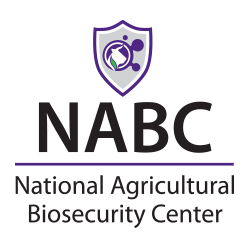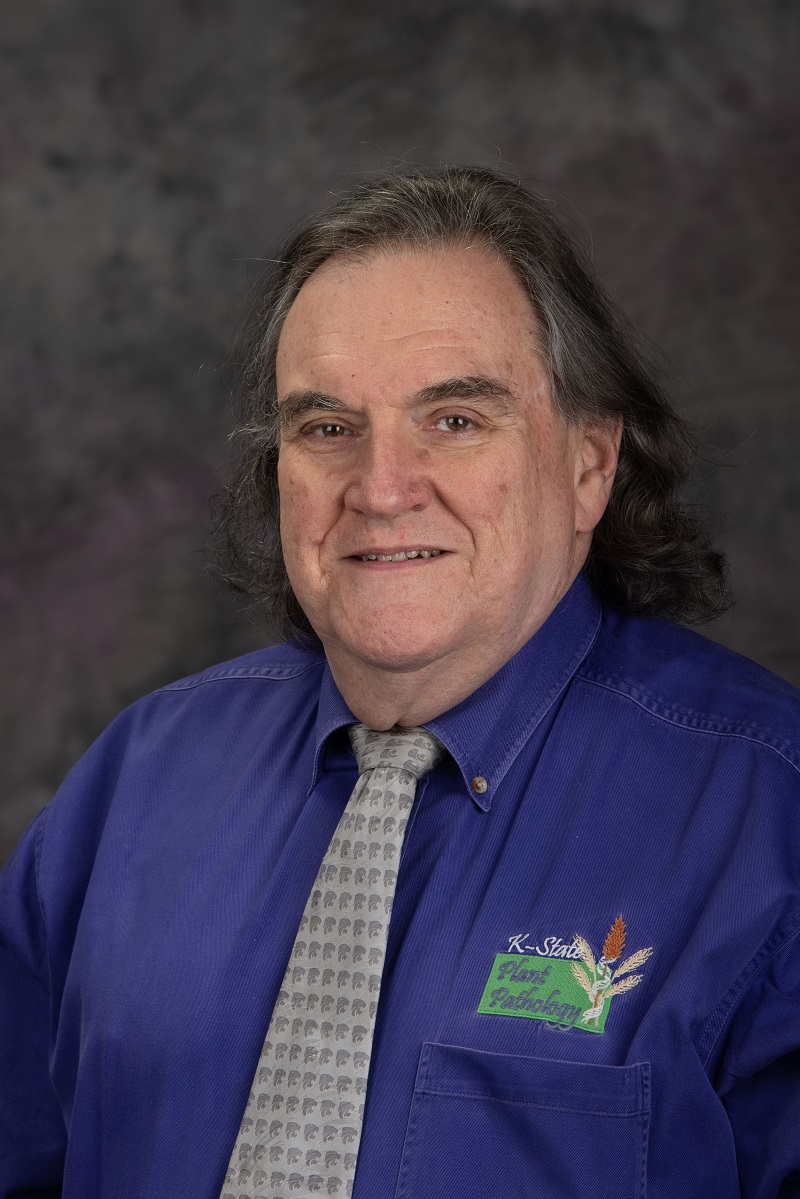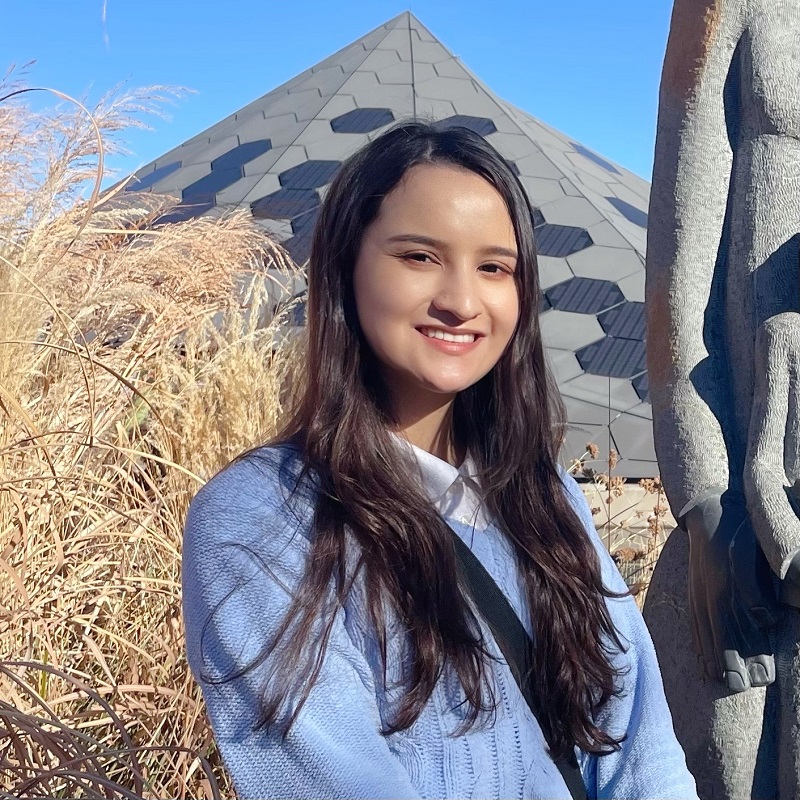K-State Current
K-State Current - May 18, 2022
K-State Current is a weekly news update for the Kansas Board of Regents to apprise the Regents on a few of the many successes and achievements made by K-State faculty, staff, and students.

K-State News
K-State receives $1.5 million grant for food, agriculture and veterinary defense project
 The National Agricultural Biosecurity Center at Kansas State University is receiving a more than $1.5 million grant from the U.S. Department of Homeland Security to protect the nation's food supply.
The National Agricultural Biosecurity Center at Kansas State University is receiving a more than $1.5 million grant from the U.S. Department of Homeland Security to protect the nation's food supply.
With the grant from DHS's Food, Agriculture and Veterinary Defense Division, the center will seek ways to support the production and economic health of the food and agricultural sectors and sustain human health through a stable and resilient food and agricultural supply chain.
"A robust defense of our nation's agriculture and food systems is as important as ever as supply chains and critical infrastructure incur heightened exposures to risk," said Adrian Self, operations research analyst at the National Agricultural Biosecurity Center, or NABC.
"Enhancing the resiliency of the food and agricultural enterprise, especially in preharvest sectors, against disruption and providing producers, processors and government agencies tools to enhance situational awareness is essential," Self said. "This is the task that has been given to the NABC."
The center will support the Food, Agriculture and Veterinary Defense Division in its role to address vulnerabilities, threats and capabilities needed for food, agriculture and veterinary readiness, overall critical Cybersecurity and Infrastructure Security Agency sector resilience, and further aiding in efforts to secure the nation's food supply, agricultural, economic and human health.
The National Agricultural Biosecurity Center has performed similar work on behalf of the U.S. Department of Defense, U.S. Department of Agriculture and Office of the Director for National Intelligence. The center also has collaborations with K-State colleges, departments and units, in addition to the federal National Bio and Agro-Defense Facility and the Kansas Department of Agriculture.
"This proposal continues previous exploratory and developmental work performed by NABC through prior DHS Food, Agriculture and Veterinary Defense Division tasks and contracts," said Marty Vanier, center director. "NABC's established working relationships and prior collaborative projects with other academic institutions; diagnostic and research laboratories; federal, state, and local agency partners; pre- and post-harvest production, processing and supply chain associations; and private industry has prepared our program to be a dominant actor in driving progress on priorities key to the nation's security."
The projects involved in these undertakings include assessing county-level readiness and capacity to respond to a high-consequence food or agricultural incident; updating animal disease response training; framework development for sharing food and agriculture information, data, and analysis; and assisting the integration and collaboration amongst federal, state, local, research and industry stakeholders.
The National Agricultural Biosecurity Center supports applied scientific research to develop practical agro-security capabilities and programs addressing diverse threats to U.S. and world agricultural economies and food supply chains. It engages elements from local, county, state, and federal governments to enhance national food security.
Veterinary research finds destressing benefit from feeding cattle industrial hemp
 Michael Kleinhenz, assistant professor of beef production medicine at the K-State College of Veterinary Medicine, has published a new study that finds benefits to feeding industrial hemp to cattle.
Michael Kleinhenz, assistant professor of beef production medicine at the K-State College of Veterinary Medicine, has published a new study that finds benefits to feeding industrial hemp to cattle.
A new study by Kansas State University finds that feeding cattle industrial hemp may have a beneficial effect on their welfare: a reduction in stress and increasing the times when they lie down.
"Cattle experience a variety of stress and inflammation," said Michael Kleinhenz, assistant professor of beef production medicine at the K-State College of Veterinary Medicine. "Our most recent data shows how cannabinoids via industrial hemp decreased the stress hormone cortisol as well as the inflammatory biomarker prostaglandin E2. This shows that hemp containing cannabidiolic acid, or CBDA, may decrease stress and inflammation in cattle. Thus, hemp may be a natural way to decrease stress and inflammation related to production practices such as transportation and weaning."
Kleinhenz has published the results of his study, "Short term feeding of industrial hemp with a high cannabidiolic acid (CBDA) content increases lying behavior and reduces biomarkers of stress and inflammation in Holstein steers," in Scientific Reports.
"Our new research helps us better understand how cannabinoids present in industrial hemp interact with bovine physiology and pharmacology," Kleinhenz said. "For instance, we now know that repeated daily doses of CBDA via feeding hemp does not result in accumulation of cannabinoids in the blood. Additionally, it solidified previous research and shows that each cannabinoid has its own absorption and elimination profile."
Another benefit observed when feeding cattle industrial hemp is that they lie down more, which can help them ruminate and produce saliva.
Kleinhenz, who is in the college's clinical sciences department, worked with a multidisciplinary team. Researchers on the project included graduate students Mikaela Weeder, Shawnee Montgomery, Miriam Martin and Andrew Curtis; and anatomy and physiology department faculty members Geraldine Magnin, Hans Coetzee, Jason Griffin and Zhoumeng Lin; K-State Research and Extension's John C. Pair Horticulture Center in Haysville; and the environmental and global health department at the University of Florida. Each brought expertise in pharmacology, toxicology and plant biology.
"If hemp is to be utilized as an ingredient in the ration of cattle, it is prudent to know and understand the pharmacokinetics and potential biological effects of cattle exposed to repeated doses of cannabinoids present in industrial hemp," Kleinhenz said. "The initial data we have collected is essential should industrial hemp and its by-products are to be considered by the U.S. Food and Drug Administration and the Association of American Feed Control Officials. Further work is needed to determine if cannabinoids can alter the stress response in cattle during stressful times such as transportation and weaning, but we hope this research is a step forward in the right direction."
Funding for this work was provided by a grant from the Agriculture and Food Research Initiative of the U.S. Department of Agriculture's National Institute of Food and Agriculture.
K-State Faculty Highlights
Vardiman named most distinguished athletic trainer from regional organization
 Phillip Vardiman, associate professor of athletic training, has been named the MAATA Most Distinguished Athletic Trainer for 2021. The Mid-America Athletic Trainers’ Association, or MAATA, presents six individual awards each year during their annual conference, set this year for March 2022. The Most Distinguished Athletic Trainer Award recognizes MAATA members who have demonstrated exceptional commitment to leadership, volunteer service, advocacy and distinguished professional activities as an athletic trainer at the district and state levels. Award winners have been members of MAATA for at least 15 years and have been a board-certified athletic trainer for at least 20 years.
Phillip Vardiman, associate professor of athletic training, has been named the MAATA Most Distinguished Athletic Trainer for 2021. The Mid-America Athletic Trainers’ Association, or MAATA, presents six individual awards each year during their annual conference, set this year for March 2022. The Most Distinguished Athletic Trainer Award recognizes MAATA members who have demonstrated exceptional commitment to leadership, volunteer service, advocacy and distinguished professional activities as an athletic trainer at the district and state levels. Award winners have been members of MAATA for at least 15 years and have been a board-certified athletic trainer for at least 20 years.
Vardiman joined K-State in 2015 as an assistant professor and program director for the athletic training program. His research interests include the human response to exercise and therapeutic clinical interventions on muscle quality and physical performance measures. As program director, he led efforts to create the new athletic training master’s program that welcomed their first cohort in summer 2021. Outside of teaching and research, Vardiman is active in his profession, having served multiple times as an athletic trainer for the USA track and field team during the world championships and the Olympics. He also currently serves as a member of the National Football League’s Athletic Training Spotter Injury Video Surveillance Program.
Vardiman’s work as an athletic trainer has been recognized by state, regional and national organizations. He is a previous recipient of the Kansas Athletic Training Society’s Athletic Trainer of the Year Award and the National Athletic Trainers Association Athletic Training Service Award.
K-State’s John Leslie to serve as Jefferson Science Fellow
 A Kansas State University distinguished professor of plant pathology will spend the next school year on assignment as a Jefferson Science Fellow in the U.S. Department of State's Office of Global Food Security.
A Kansas State University distinguished professor of plant pathology will spend the next school year on assignment as a Jefferson Science Fellow in the U.S. Department of State's Office of Global Food Security.
John Leslie is among 14 individuals nationwide selected as 2022-2023 Jefferson Science Fellows. Established in 2003 as an initiative of the Office of the Science and Technology Adviser, the Jefferson Science Fellows Program is designed to build science, technology and engineering expertise within the State Department and the U.S. Agency for International Development. The program is open to tenured or similarly ranked senior faculty from U.S. institutions of higher learning who are U.S. citizens.
Jefferson Science Fellows spend one year as science advisers at the State Department or USAID, providing expertise on issues relevant to foreign policy or international development. Assignments are tailored to the needs of the hosting office and utilize the fellow's interests and areas of expertise. Following the fellowship year, fellows return to their home institutions and academic careers but remain available to the U.S. government as experienced consultants for short-term projects.
As a member of the 19th class of fellows, Leslie will help strengthen the Department of State's interactions with scientists and academics in the United States and elsewhere in the world. His expertise in agriculture, biotechnology, genetics, and food safety and security will provide immediate answers to food-related problems or quick connections to others in the field with the right expertise. Leslie's responsibilities in the Global Food Security Office will mirror portions of the agricultural, biosecurity and biosafety emphases in the K-State Economic Prosperity Plan.
Concerns of Kansas farmers and ranchers are not uncommon in other parts of the world. Leslie believes international cooperation is the best way to both address and solve these issues and synthesize new approaches to these problems.
"My career as a scientist has focused on discerning and describing new facts and relationships to provide a better understanding of the world and how it works," Leslie said. "As a Jefferson Science Fellow, I get to use my knowledge of scientific facts and processes to help ground U.S. foreign policy in science, to employ K-State values and experiences to help shape the way our country interacts with the rest of the world, and to bring back to Manhattan knowledge of food security policy that will inform and guide activities within the K-State community.”
A fungal geneticist, Leslie is a recognized expert in fungal systematics, plant pathology, international agriculture and mycotoxicology. With research focusing on plant disease-causing and toxin-producing fungi in the genus Fusarium, Leslie's work has been published in a patent, seven books and more than 160 refereed journal articles that have been cited approximately 19,000 times. He is a fellow of the American Association for the Advancement of Science, the American Phytopathological Society and St. Paul's College at the University of Sydney, Australia. He also is an honorary research fellow at the Royal Botanic Gardens in Sydney and an honorary international member of the Hungarian Academy of Sciences.
Leslie has extensive experience working with USAID programs, including 25 years as part of USAID-sponsored work with the International Sorghum and Millet Collaborative Research Support Program, known as the INTSORMIL-CRSP. After serving as head of K-State's top-rated plant pathology department for nine years, Leslie transitioned to interim director of K-State's USAID-sponsored Feed the Future Innovation Lab for the Reduction of Post-Harvest Loss — one of four Feed the Future Labs at K-State. Under his leadership, the lab developed and completed a special $1.2 million USAID mission in Afghanistan and continued extensive activities in Bangladesh, Ethiopia, Ghana and Guatemala.
A former senior Fulbright scholar to Australia, Leslie conceived and leads the award-winning K-State Australia Initiative, a unique international university activity that has brought more than $6 million in research funding to the university and includes a distinctive partnership with Fulbright Australia. K-State hosts a Distinguished Fulbright Chair in Agriculture and Life Sciences for an eminent Australian researcher. Through the Oz-to-Oz program, K-State brings all faculty-level Australian Fulbrighters to K-State for a professional visit with colleagues on campus. This program was recognized for excellence by the International Institute of Education with a Heiskell Award.
Since 2000, Leslie has organized and co-taught the Fusarium Laboratory Workshop annually in Kansas and in six other countries, attended by more than 700 people from more than 70 countries.
Leslie joined K-State in 1984 and was named a university distinguished professor, the university's highest faculty ranking, in 2011. He earned his doctorate from the University of Wisconsin, Madison and has experience as a postdoctoral fellow at Stanford University and as a research microbiologist in industry.
K-State Student News
Alumna, student each receive Fulbright US program recognition
The Fulbright U.S. Student Program is recognizing a Kansas State University recent graduate and a current student: Annie Cortes, a 2021 graduate in elementary education, Pittsburg, and Kayla Craigmile, senior in Spanish, anthropology and international studies, Shawnee.
 Cortes is a Fulbright finalist and has been offered a Fulbright grant to serve as an English teaching assistant in Taiwan. Craigmile was selected as a Fulbright alternate to attend the University College of London's Institute of Education master's program in applied linguistics.
Cortes is a Fulbright finalist and has been offered a Fulbright grant to serve as an English teaching assistant in Taiwan. Craigmile was selected as a Fulbright alternate to attend the University College of London's Institute of Education master's program in applied linguistics.
The Fulbright programs create international educational exchange opportunities to increase mutual understanding between the people of the U.S. and the people of other countries. Fulbright grant recipients receive round-trip transportation, tuition when applicable and a monthly living stipend for one academic year abroad. Alternates could be named as recipients at any time while the current award period is open.
"Fulbright is open to many different academic disciplines and many different kinds of proposals, but they are always looking for individuals who will help them meet that mission of increasing mutual understanding," said Jim Hohenbary, director of the K-State Office of Nationally Competitive Scholarships. "In addition to being great students, Annie and Kayla are both fundamentally interested in building bridges through language learning, and I am sure that this resonated with Fulbright reviewers."
Cortes will spend the 2022-2023 academic year as an English teaching assistant in Taiwan, a country she first visited through a study abroad experience in the summer of 2018. When she attended K-State, she was involved in Circle K International and served as vice president from 2019-2020 and as Kansas district secretary from 2020-2021. She also was president of the Asian American Student Union for 2020-2021, social chair for the Smurthwaite Scholarship and Leadership House for 2018-2019, and a member of Alpha Phi Omega service fraternity. She received the Tomorrow's Teacher Award from the College of Education in 2017.
She graduated summa cum laude from K-State in 2021 with an emphasis in English as a second language and a minor in Japanese. Since graduation, she has been working as an English as a second language paraprofessional in the Pittsburg school district.
Cortes is the daughter of Bienvenido and Paige Cortes and a graduate of Pittsburg High School.
 Craigmile is an undergraduate research assistant in the modern languages department under Andrea Faber, assistant professor, and is exploring grammatical gender concordance in native and heritage Spanish speakers. She is in the process of finishing and publishing her honors thesis, "A Holistic Analysis of Humor’s Effect on Second Language Acquisition," which investigates the role of humor in second language acquisition in the context of second language classrooms and homestays in San Jose, Costa Rica.
Craigmile is an undergraduate research assistant in the modern languages department under Andrea Faber, assistant professor, and is exploring grammatical gender concordance in native and heritage Spanish speakers. She is in the process of finishing and publishing her honors thesis, "A Holistic Analysis of Humor’s Effect on Second Language Acquisition," which investigates the role of humor in second language acquisition in the context of second language classrooms and homestays in San Jose, Costa Rica.
Craigmile is involved in multiple student organizations at K-State. She has served as the financial chair of International Buddies and as the Wildcats Forever chair for the Student Alumni Board. She was on the service committee for Mortar Board Senior Honor Society and is a member of the Asian American Student Union, Anthropology Club and Kappa Delta sorority. She is involved in the University Honors Program and is a Snyder Leadership Legacy Fellow. She has received the Benjamin A. Gilman International Scholarship, the Joey Lee Garmon Scholarship for Social Justice, the Doug Benson Scholarship and the Dr. Pat Bosco Graduate Student Scholarship.
Craigmile is the daughter of Scott and Tammie Green and a graduate of Shawnee Mission Northwest High School.
K-State students interested in the next application cycle for the Fulbright U.S. Student grant should contact Jim Hohenbary at jimlth@k-state.edu for more information. Students are encouraged to begin planning their application well ahead of the Aug. 15 campus deadline.